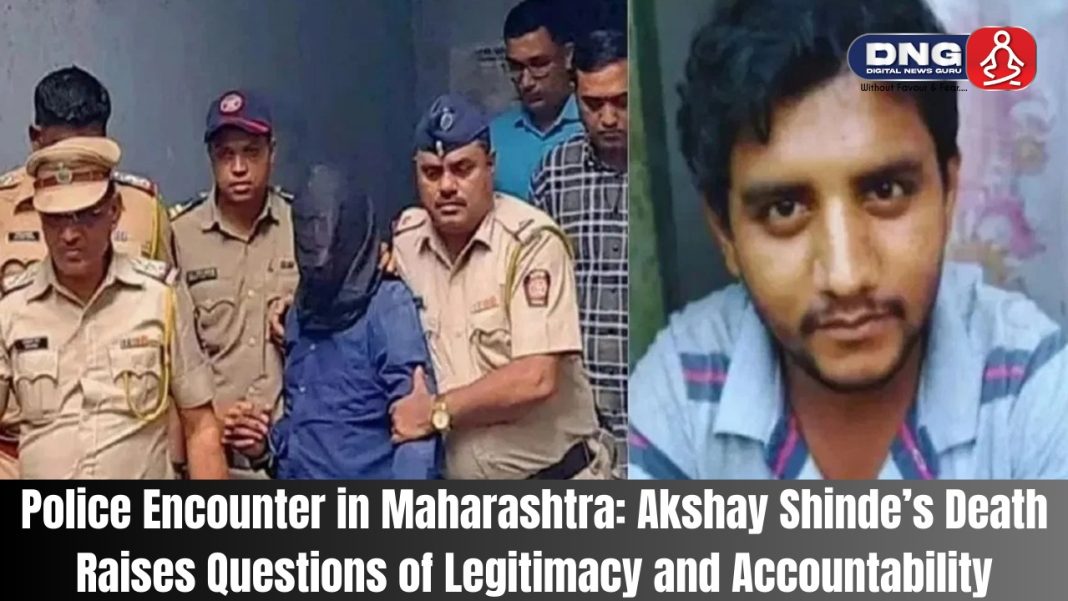DIGITAL NEWS GURU MAHARASHTRA DESK:
Police Encounter in Maharashtra: Akshay Shinde’s Death Raises Questions of Legitimacy and Accountability
A recent police encounter in Maharashtra has become the subject of intense scrutiny and debate after the death of Akshay Shinde, an accused in a serious sexual assault case, was reported.
The encounter, which took place on September 24, 2024, in Badlapur, a town in the Thane district of Maharashtra, has drawn a mix of public reactions—ranging from praise for law enforcement’s swift action to calls for an investigation into the legitimacy of the encounter itself. Political parties and human rights groups have also stepped into the fray, intensifying the conversation around police encounters, accountability, and the rule of law.
The Incident: What We Know So Far

Akshay Shinde was wanted by the police for his alleged involvement in a brutal sexual assault case that had sparked public outrage and led to widespread calls for justice. According to initial reports, Shinde was evading arrest for several weeks before being tracked down by the police. Maharashtra police claim that Shinde opened fire when cornered, prompting the officers to retaliate in self-defense, resulting in his death.
Eyewitness accounts of the encounter remain sparse, and police officials have stated that they followed standard procedures before opening fire. The authorities allege that Shinde, armed and dangerous, posed an immediate threat, leaving them no choice but to use lethal force. In line with police statements, the encounter reportedly occurred after a prolonged chase, with Shinde attempting to escape the police dragnet. His death has since led to public relief among some citizens, especially given the horrific nature of the crime he was accused of.
However, the lack of transparency in such incidents, combined with past cases of questionable police encounters, has raised serious concerns among human rights organizations and political parties alike.
Background: A History of Controversial Encounters in Maharashtra

Maharashtra has witnessed several high-profile police encounters over the years. While encounters often receive public support, especially when the individuals killed are accused of heinous crimes, they also generate significant controversy. India, and Maharashtra in particular, has a long history of police encounters being viewed as a means of dispensing instant justice, bypassing the judicial process.
This practice, though lauded by many for its perceived effectiveness in handling dangerous criminals, has also attracted criticism from human rights groups for often being shrouded in mystery, with questions raised about whether such actions were truly justified or extrajudicial. Extrajudicial killings, sometimes referred to as “fake encounters,” are not unheard of in the country. In such cases, law enforcement officers have been accused of killing suspects without sufficient cause, later framing the events as an act of self-defense.
The Maharashtra police have defended their track record on encounters, citing that they only resort to lethal measures in extreme situations where lives of officers or civilians are at immediate risk. However, past incidents have left many skeptical about the veracity of these claims.
Political Fallout and Public Sentiment

Shinde’s death has become the latest flashpoint in Maharashtra’s political landscape, with opposition parties and civil rights groups questioning the legality of the encounter. Political leaders from parties like the Shiv Sena (Uddhav Thackeray faction) and Nationalist Congress Party (NCP) have demanded an independent inquiry into the incident, alleging that the encounter was staged to cover up systemic failures in law enforcement and the criminal justice system.
“The public deserves to know the truth. If this was a genuine encounter, then the police have done their job. But if this was another staged killing to suppress facts, we demand full accountability,” said a spokesperson from the NCP. Former Chief Minister Uddhav Thackeray also added his voice, calling for a transparent investigation to ensure that the police were not acting as “judge, jury, and executioner.”
Conversely, several political and social factions, including sections of the Bharatiya Janata Party (BJP), have hailed the encounter as a justified response to a violent criminal. “This is what is needed to keep our streets safe from monsters like Shinde. The police did what was necessary, and they deserve our support, not scrutiny,” said a BJP spokesperson in response to the criticism.
Public sentiment on the encounter is divided. On one hand, many citizens who were angered by the sexual assault case are satisfied with the swift “justice” delivered through the encounter, seeing it as a deterrent to future criminals. On the other hand, civil society groups argue that justice should be served through courts and legal systems, not through what they term as vigilante-style policing.
Calls for Judicial Accountability and Human Rights Concerns
The People’s Union for Civil Liberties (PUCL) and Amnesty International India have condemned the killing, calling it an example of extrajudicial violence that highlights serious issues with the rule of law in India. “Police encounters like these bypass due process and violate the basic human rights of the accused, no matter how heinous their alleged crime. The legal system exists for a reason, and we must not allow public pressure or political convenience to override it,” a PUCL spokesperson said.
These organizations have demanded a judicial inquiry into the encounter to ascertain whether police officers followed proper protocol or if there were any violations of legal procedures. They argue that police impunity in cases of alleged extrajudicial killings undermines the public’s faith in the justice system and can lead to an escalation of violence and lawlessness.
The Supreme Court of India has laid down guidelines for police encounters, including mandatory filing of an FIR, judicial review of the incident, and compensation for the families of those killed if the encounter is found to be unlawful. In light of these guidelines, human rights groups are urging the Maharashtra government to ensure compliance and prevent the recurrence of such incidents.
Conclusion: A Polarizing Debate on Justice and Law Enforcement

The police encounter that led to Akshay Shinde’s death has once again brought to the fore the polarizing debate between swift justice and judicial due process. While many citizens and political figures are satisfied with the elimination of a dangerous criminal, the increasing trend of such encounters raises important questions about the balance between effective law enforcement and the protection of human rights.
As the investigation into the encounter continues, the broader implications for Maharashtra’s legal system and police accountability will undoubtedly remain in the spotlight. Whether this case leads to reforms in how encounters are handled or further reinforces the practice remains to be seen. However, the incident has certainly reignited a crucial conversation about how far law enforcement can—and should—go in their pursuit of justice.
YOU MAY ALSO READ: Pulwama Attack Accused Dies of Heart Attack in Custody








